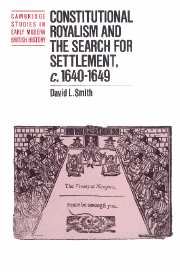Book contents
- Frontmatter
- Contents
- Acknowledgements
- List of abbreviations
- A note on quotations, sources, dates and terminology
- PART I THE ORIGINS OF CONSTITUTIONAL ROYALISM
- PART II CONSTITUTIONAL ROYALISM IN THEORY AND PRACTICE, 1642–1649
- PART III CONSTITUTIONAL ROYALISM IN PERSPECTIVE
- 8 Epilogue: Constitutional Royalism from Regicide to Restoration
- 9 Legacy: an ideology vindicated?
- 10 Conclusion: assessment and evaluation
- Bibliography
- Index
- Cambridge Studies in Early Modern British History
9 - Legacy: an ideology vindicated?
from PART III - CONSTITUTIONAL ROYALISM IN PERSPECTIVE
Published online by Cambridge University Press: 01 October 2009
- Frontmatter
- Contents
- Acknowledgements
- List of abbreviations
- A note on quotations, sources, dates and terminology
- PART I THE ORIGINS OF CONSTITUTIONAL ROYALISM
- PART II CONSTITUTIONAL ROYALISM IN THEORY AND PRACTICE, 1642–1649
- PART III CONSTITUTIONAL ROYALISM IN PERSPECTIVE
- 8 Epilogue: Constitutional Royalism from Regicide to Restoration
- 9 Legacy: an ideology vindicated?
- 10 Conclusion: assessment and evaluation
- Bibliography
- Index
- Cambridge Studies in Early Modern British History
Summary
The Constitutional Royalism of the 1640s was in part a response to a specific set of political circumstances. It involved an attempt to guide Charles I towards a distinctive vision of constitutional monarchy characterised by royal sovereignty within the rule of law, a symbiotic relationship between the Crown and Parliament, and the preservation of an episcopalian Church of England. Though these ideas drew upon earlier traditions within English political and religious thought, the form in which they were expressed and the urgency with which they were advanced owed much to the particular climate of England before and during the Civil Wars. Constitutional Royalist attitudes can only be fully understood against this background. Equally, it is important to recognise that the view of the constitution which they embraced remained widespread after 1660. This chapter will examine the extent to which Constitutional Royalism influenced the Restoration settlement, the appointment of some of its leading protagonists to senior offices of state, and the continuing influence of their ideas through the later seventeenth century and beyond.
The platform on which Charles II was restored received its classic expression in the Declaration of Breda on 4 April 1660. This was, so to speak, the manifesto of the Restoration regime. It was drafted by the King with the advice of Hyde, Ormond and Nicholas, and to be understood fully it needs to be seen less as a strategic masterstroke than as another expression of the Constitutional Royalist vision of Church and State. Read within such a context, it takes on some remarkable resonances which mark it as the culmination of two decades of constitutional and religious thought.
- Type
- Chapter
- Information
- Publisher: Cambridge University PressPrint publication year: 1994



